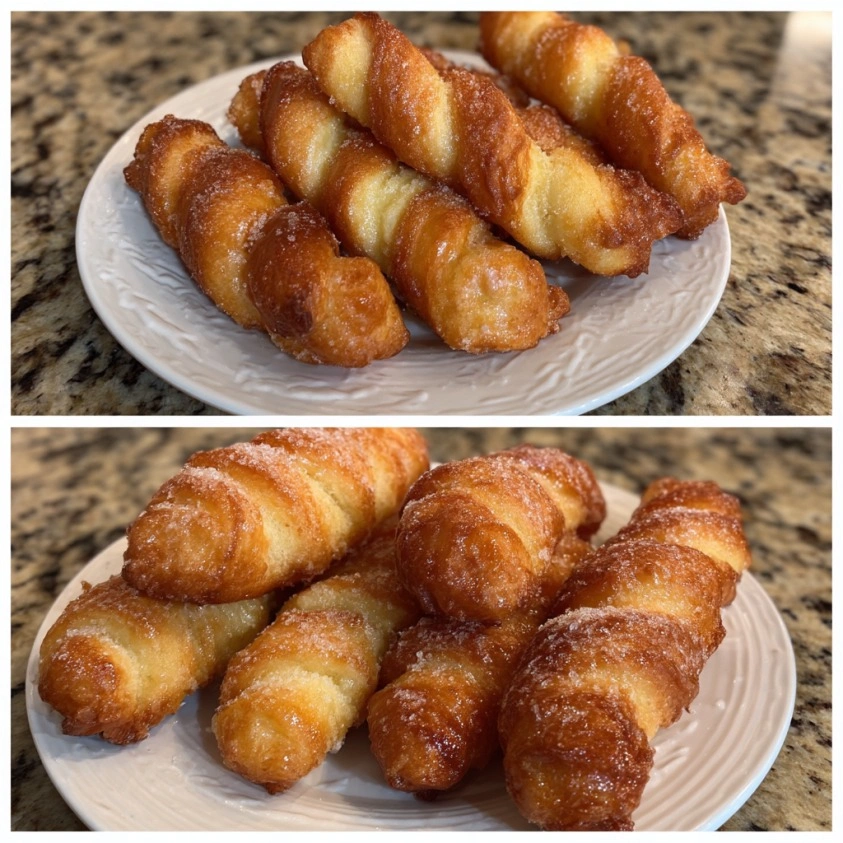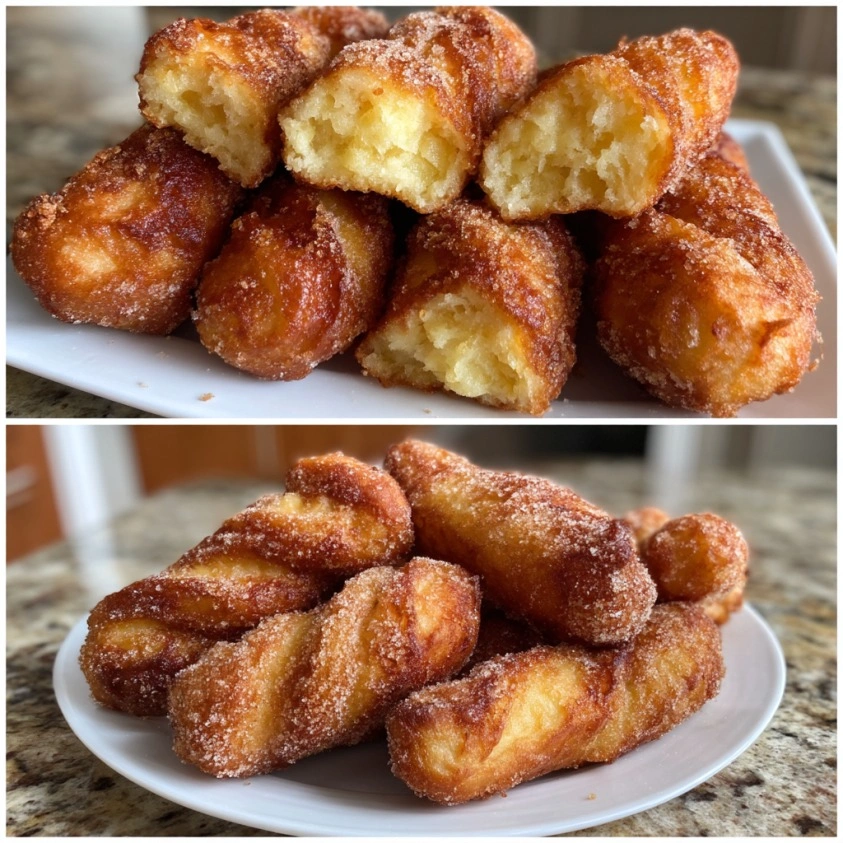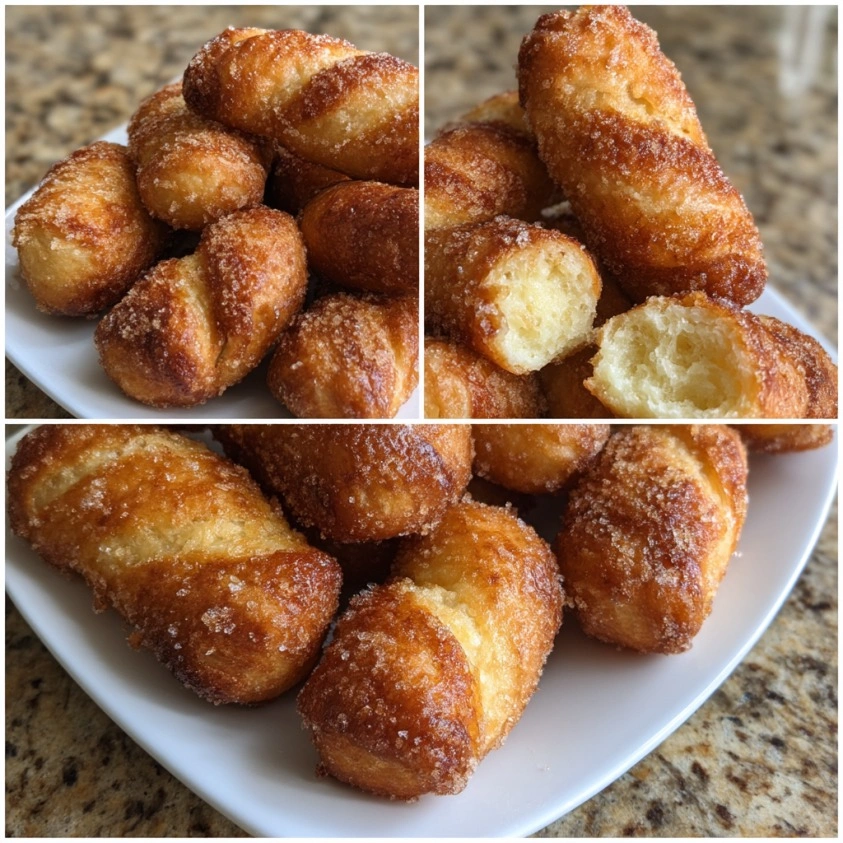There are few kitchen pleasures as universally loved as homemade doughnuts, and this recipe for Classic Citrus Ricotta Doughnut Twists elevates that joy to a whole new level. These doughnuts are not only fluffy and light, but they’re also infused with the bright, sunny notes of fresh lemon and orange zest. Whether you’re an experienced baker or a weekend cooking enthusiast, this recipe invites you to create an indulgent treat that feels both nostalgic and fresh. Perfectly twisted, fried to golden perfection, and dusted with cinnamon-sugar, these ricotta doughnuts are destined to become a new favorite.
Why You’ll Love This Recipe
To begin with, the texture of these doughnuts is simply irresistible. Thanks to the ricotta cheese, each bite melts in your mouth with a tender, creamy crumb. Furthermore, the citrus zest adds a lively brightness that balances the richness of the fried dough. In addition, this recipe doesn’t require yeast, which means no rising time—just mix, shape, fry, and enjoy. These doughnuts are also a versatile dessert, equally perfect for brunches, holiday gatherings, or a cozy weekend indulgence. Lastly, they are visually stunning, with elegant twists that make them look as good as they taste.
Ingredients
- 1 cup whole-milk ricotta cheese
- ¼ cup granulated sugar
- 1 large egg
- 1 teaspoon vanilla extract
- Zest of 1 lemon
- Zest of 1 orange
- ¼ cup (1/2 stick) unsalted butter, melted
- 1½ cups all-purpose flour
- 2 teaspoons baking powder
- ½ teaspoon salt
- Vegetable oil, for frying
- Cinnamon-Sugar Coating: ½ cup granulated sugar + 1 teaspoon ground cinnamon
Necessary Tools
To prepare Classic Citrus Ricotta Doughnut Twists seamlessly, you’ll need the following kitchen tools:
- Mixing bowls (medium and large)
- Whisk
- Rubber spatula
- Rolling pin
- Sharp knife or pizza cutter
- Heavy-bottomed pot or deep fryer
- Slotted spoon
- Paper towels
- Candy or deep-fry thermometer
- Shallow bowl or dish for cinnamon-sugar coating

Ingredient Swaps and Additions
While this recipe is fantastic as-is, you can easily tailor it to your preferences. For example, if you prefer a different citrus profile, you could use lime zest instead of lemon or orange. Additionally, try adding a touch of almond extract in place of vanilla for a nuttier undertone. If you’re avoiding refined sugar, coconut sugar can be a great alternative in both the dough and coating. For added spice, a pinch of ground nutmeg or cardamom can deepen the flavor beautifully. Finally, for a gluten-free variation, use a gluten-free all-purpose flour blend, though results may slightly vary in texture.
Step-by-Step Instructions
1. Make the Dough: In a medium mixing bowl, whisk together ricotta, sugar, egg, vanilla extract, lemon zest, orange zest, and melted butter until the mixture is smooth and well combined. This creates a flavorful and creamy base.
2. Add Dry Ingredients: In a separate bowl, mix together the flour, baking powder, and salt. Gradually add the dry ingredients to the ricotta mixture, folding gently with a spatula until a soft, slightly sticky dough forms. Avoid overmixing, as this can make the doughnuts dense.
3. Shape the Twists: Lightly flour a clean work surface and turn out the dough. Pat or roll the dough into a ½″-thick rectangle. Cut the dough into 1″-wide strips using a sharp knife or pizza cutter. Gently twist each strip several times to form a spiral, then set aside.
4. Heat the Oil: Pour vegetable oil into a heavy-bottomed pot to a depth of 2 to 3 inches. Heat the oil to 350°F (175°C), monitoring with a deep-fry thermometer to maintain a consistent temperature.
5. Fry the Doughnuts: Carefully lower the dough twists into the hot oil in batches, avoiding overcrowding. Fry each twist for about 2 minutes per side, or until they turn a deep golden brown. Use a slotted spoon to transfer fried doughnuts to a paper towel-lined plate.
6. Coat in Cinnamon-Sugar: While still warm, toss each doughnut twist in a shallow dish of cinnamon-sugar until generously coated.
7. Serve: These doughnuts are best enjoyed fresh and hot, when the sugar crust is crisp and the inside is tender and airy. Serve them plain or alongside a citrus glaze or hot coffee.
Pro Tips for Success
Firstly, make sure the oil stays at a consistent 350°F; fluctuating temperatures can cause greasy or undercooked doughnuts. Secondly, don’t skip the zest—it’s what gives these doughnuts their bright, citrusy punch. Additionally, shape the dough gently to keep it light and fluffy. It’s also a good idea to taste-test the first batch and adjust frying time if necessary. Lastly, use a cookie scoop or spoon to ensure even portions, which leads to uniform frying and prettier presentation.
Serving Suggestions
These doughnut twists are delightful on their own, but there are plenty of ways to elevate your presentation. For instance, serve them with a citrus glaze made from powdered sugar and fresh juice. Alternatively, offer them with a side of whipped ricotta sweetened with honey. They also pair beautifully with coffee, chai, or even a sparkling mimosa for a brunch upgrade. If you’re entertaining, try stacking them on a cake stand or threading them onto skewers for a fun dessert centerpiece.

Storing and Reheating
To store, allow doughnuts to cool completely before placing them in an airtight container. They can be kept at room temperature for up to 2 days. For longer storage, freeze in a zip-top bag with parchment between layers for up to 1 month. To reheat, place doughnuts on a baking sheet and warm in a 300°F oven for 5-7 minutes. Avoid microwaving, as it may make the coating soggy and the interior rubbery.
Nutritional Information (per doughnut)
- Calories: ~210
- Total Fat: 12g
- Saturated Fat: 5g
- Cholesterol: 35mg
- Sodium: 130mg
- Total Carbohydrates: 22g
- Sugars: 7g
- Protein: 4g
FAQs
1. Can I make the dough in advance?
Yes, you can prepare the dough and store it wrapped in the refrigerator for up to 24 hours.
2. Can I bake these instead of frying?
While possible, baking will not yield the same texture or crispness. Frying is recommended for best results.
3. Can I use part-skim ricotta?
Yes, but whole-milk ricotta will offer a richer flavor and better texture.
4. What’s the best oil for frying?
Vegetable oil, canola oil, or peanut oil are all good options due to their high smoke points.
5. How do I prevent the twists from unraveling during frying?
Give them a firm twist and press the ends slightly to hold the shape before placing them in the oil.

Conclusion
Classic Citrus Ricotta Doughnut Twists are a brilliant marriage of nostalgic comfort and zesty modern flair. Their delightful texture, subtle sweetness, and irresistible citrus aroma make them a standout choice for any sweet occasion. Whether served at a brunch table or savored with evening tea, they deliver joy in every bite. If you loved this recipe, explore more irresistible treats that bring simple ingredients to life with a creative twist.




